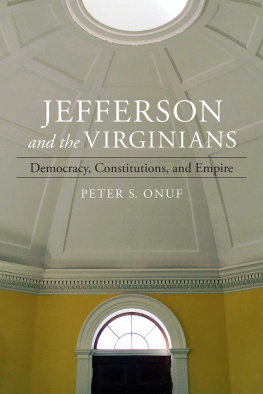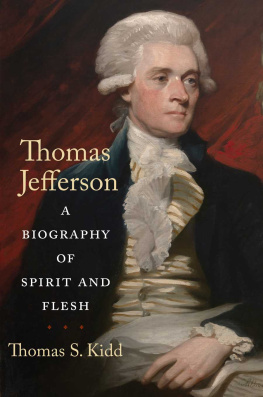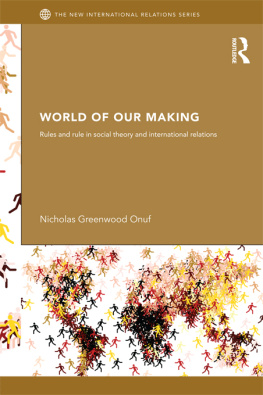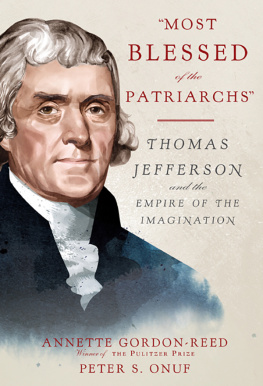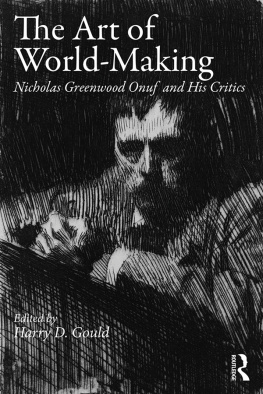Published with the assistance of the V. Ray Cardozier Fund
Published by Louisiana State University Press
Copyright 2018 by Louisiana State University Press
All rights reserved
Manufactured in the United States of America
First printing
Designer: Barbara Neely Bourgoyne
Typeface: Adobe Garamond
Printer and binder: Sheridan Books
Library of Congress Cataloging-in-Publication Data
Names: Onuf, Peter S., author.
Title: Jefferson and the Virginians : democracy, constitutions, and empire / Peter S. Onuf.
Other titles: Walter Lynwood Fleming lectures in southern history.
Description: Baton Rouge : Louisiana State University Press, [2018] | Series: Walter Lynwood Fleming lectures in southern history | Includes bibliographical references and index.
Identifiers: LCCN 2018007296 | ISBN 9780807169896 (cloth : alk. paper)
Subjects: LCSH: Jefferson, Thomas, 17431826Political and social views. | VirginiaHistory17751865. | StatesmenVirginiaHistory.
Classification: LCC E332.2 .O57 2018 | DDC 973.4/6092dc23
LC record available at https://lccn.loc.gov/2018007296
The paper in this book meets the guidelines for permanence and durability of the Committee on Production Guidelines for Book Longevity of the Council on Library Resources.

Preface and Acknowledgments
It has been a privilege spending so much time with Thomas Jefferson over the course of my career. As the essays in this book should make clear, I remain deeply conflicted about my subject. I reflexively resist the idea that I am his biographer, and I do not pretend or aspire to be an expert on all matters Jeffersonian. Yet I have to confess that Jefferson has increasingly engaged my sympathy as well as attention in my last efforts to make sense of his life and thought. Taking a comprehensive look at the arc of his private life and public career in the good company of my dear friend Annette Gordon-Reed may have something to do with this more accepting, less judgmental attitude toward Jefferson.
In famously invoking the principle of equality, the author of the Declaration of Independence enjoined Americans to recognize one another as fellow citizens and acknowledge the bonds of sentiment and obligation that made them a people. The book I wrote with Annette, Most Blessed of the Patriarchs: Thomas Jefferson and the Empire of the Imagination (2016), represents our effort to see him across the centuries, in his own world, and so to recognize himfor all his many and all too consequential failingsas a fellow American. What does it mean to be American? Who are we as a people, if we are one at all? A better understanding of Jefferson does not offer easy answers to these compelling questions. To the contrary, it has become clear to me that Jefferson himself found these questions profoundly troubling. The ultimate success of the new nations experiment in republican self-government was by no means foreordained, and his faith in mans capacity for progress and improvement was sorely tested.
In retrospect, the failings of Jefferson and his generation are conspicuous to us. It is much harder to look with them toward an uncertain future, anxiously hoping that rising generations would see a way forward, animated by their own visions of progress and improvement. Jeffersons anxieties, most eloquently expressed in his retirement years, resonate with ours. In these troubled days, our faith in ourselves, in our identity and future as a people, is also being tested.
My design in this volume is to situate Jefferson in successively more capacious contexts, from Revolutionary Virginia, to the more perfect union of American state-republics, and finally to the federal republics providential destiny as a great continental empire. In each of these contexts, I pair Jefferson with a Virginian interlocutor and focus their conversation on a critical theme for the future of commonwealth and continent. Jeffersons thinking about democracy was shaped by his troubled relationship with Patrick Henry, the great patriot whose stirring oratory ignited the Revolution in Virginia. Jeffersons collaboration with lifelong friend and ally James Madison shaped his constitutional thought, setting the stage for his career as leader of the Republican opposition to the Federalist administrations of George Washington and John Adams. When President Jefferson looked westward and into the future, beyond the partisan divisions that nearly destroyed the union in the 1790s, his vision of Americas empire for liberty was grounded in an imagined, posthumous reconciliation with former Federalist foe Washington. In his Inaugural Address, Jefferson celebrated the indispensable role Washington had played in securing the independence Jefferson declared.
The erudite Jeffersons thinking drew on the books in his vast, ever-expanding library. But its deeper sources can be found in his sometimes friendly and sometimes hostile relationships with his contemporaries, including most notably and most influentially these three prominent Virginians. Jefferson does not emerge as the superior or dominant figure in the conversations I have reconstructed. But as Jefferson emerges from the isolation of his study, he becomes a more complicated, interesting, and ultimately more accessible figure.
I remain conflicted about my subject, but I am eternally grateful for the many good friends Ive made in the world of Jefferson studies. A partial list includes Frank Cogliano, Christa Dierksheide, Joanne Freeman, Annette Gordon-Reed, Matt Hale, David Konig, Csaba Levai, Jan Lewis, Armin Mattes, Johann Neem, John Ragosta, Hannah Spahn, Brian Steele, Alan Taylor, Maurizio Valsania, and George Van Cleve. Our friends Jim Horn and Andrew OShaughnessy, successive directors of the International Center for Jefferson Studies at Monticello, have provided a congenial setting in Charlottesville and at conferences around the world in which Jeffersonian friendships have flourished.
Frank, Annette, and John offered helpful readings of specific chapters of this book; Matt and Brian read the entire manuscript with extraordinary care. Matts pathbreaking work on early American democracy helped spur my own thinking on that urgent and compelling theme. Brian suggested that I needed to explain what Iand my subjectsmeant by Virginia in order to frame this books larger argument, thus prompting me to draft the introductory essay. Georges important new book We Have Not a Government: The Articles of Confederation and the Road to the Constitution (2017) refreshed and revised my understanding of the critical period. Non-Jeffersonians Jon Kukla and Alan Gibson provided invaluable counsel on Patrick Henry and James Madison, respectively. Jons fine biography, Patrick Henry: Champion of Liberty (2017), should change the way we all think about his subject, particularly those who have been led astray by Jefferson; Alans mastery of the literature by and about Madison kept me pointed in the right direction, though he may think I have occasionally wandered afield. I am also grateful to Joanne Allen, my extraordinary copyeditor, who helped put the finishing touches on this book.

